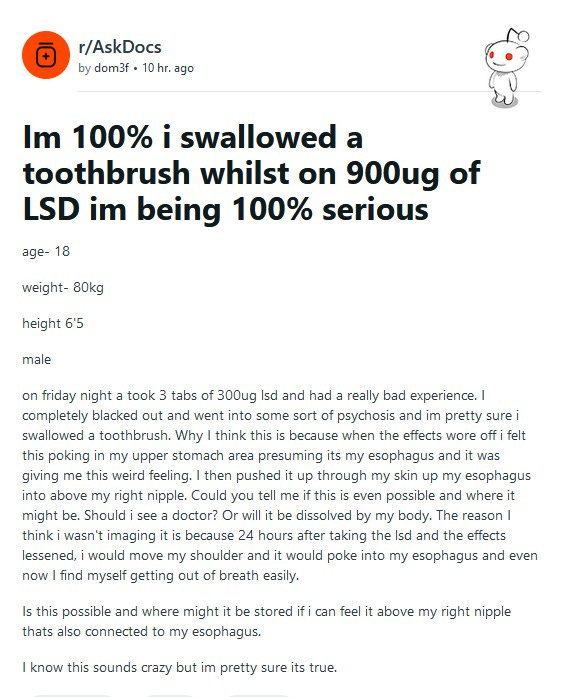What's up, Robo-doc?
Can you tell the difference between an AI physician and the real McCoy? (Hint: The AI doc is the one who actually seems to care.)
The Doctor, an emergency medical hologram from Star Trek: Voyager, played to acerbic perfection by actor Robert Picardo.
I was talking with my therapist Mervin the other day when I asked whether he thought that he, or other members of his profession, might one day be replaced by AI. No, he said, because AI lacks empathy.
But a better question might be, can AI simulate empathy? And is that good enough? A recently published study by researchers at the University of California in San Diego suggests that it can, and that it is.
Last fall, researchers asked ChatGPT nearly 200 medical questions, then compared the quality and empathy of its answers to those of actual physicians, as graded by a team of licensed healthcare professionals.
You know where this is going, right? ChatGPT kicked their lab-coat-wearing asses. Evaluators preferred the chatbot's answers for both accuracy and bedside manner nearly 80 percent of the time.
I mean, Russian elections aren't this lopsided. Even the Washington Generals had a better winning record against the Globetrotters. This is a "Bambi Meets Godzilla" level of defeat.
When interviewed by Axios reporter Tina Reed, lead researcher John Ayers had this explanation:
"It's pretty obvious why AI was better. It's not constrained by time... You could take a simple query like: 'I have a headache, can you help me?' and you'll immediately see ChatGPT say 'I'm sorry you have a headache,'" Ayers said. "The doctor knows that, they feel that. They don't have time to say it."
Ayers has a point. I used the stopwatch app on my phone to time exactly how long it takes to say, "I'm sorry you have a headache." Just a hair under 2 seconds.
Assuming the doctor sees 20 patients a day, 5 days a week, with two weeks off annually for vacation, not saying, "I'm sorry you have a headache" saves devotees of the Hippocratic Oath almost three hours a year. [1]
The acid test
The questions used in the test were taken from the Reddit AskDocs forum, where people apparently seek medical advice from random strangers on the Internet. Because, of course they do. Don't you?
I visited r/AskDocs to see what I could find. Here is a screen capture of the first question I encountered.
Who among us, I ask you, has not a) taken at least 9x too much LSD, b) accidentally swallowed a toothbrush, and c) felt it emerging from their right nipple, which is somehow connected to their esophagus?
This was then followed by a long discussion of other toothbrushes having been found in sundry other parts of the human digestive tract [2], along with some very practical advice for the patient [3].
Suddenly I'm having a lot more sympathy for members of the medical profession.
Doctor who?
Over the years I've had some really good personal physicians and some not-so-good ones. The latter category all had certain personality traits in common: arrogant, cold, dismissive. Like they had better things to do than deal with my annoying physical ailments. [4] So I am finding the results of that study somewhat less than shocking.
You expect a robot to have a robotic personality. The human who's boldly putting their fingers where no man has gone before, not so much. You maybe want to have a little chit-chat first, or at least have them warm their hands before asking you to turn your head and cough.
The UCSD researchers concluded that tools like ChatGPT could be helpful to time-stressed medical professionals by allowing them to answer questions more quickly (and "humanly"), especially as more health care is delivered over the Interwebs.
AI researchers are already working on ways machines can simulate, if not actually experience, empathy. People are using chatbot apps for help with isolation, depression, or anxiety. Even Psychology Today is speculating about how AI can serve as an "extender" of traditional psychotherapy, if not an outright replacement. [5]
Robo-docs and robo-shrinks are coming. They may not be as witty as The Doctor, or a mensch like Mervin, but they'll be here before we know it. Let's hope they've been programmed to keep their hands warm.
Would you see an AI doc or a simulated shrink? Share your thoughts, along with any common household objects you accidentally ingested, in the comments below.
[1] That's almost enough time to a) seek a cure for cancer, b) fill out three insurance forms, or b) play a round on the back nine and grab a drink in the clubhouse afterwards.
[2] One of the universal truths of life is that everyone knows somebody who once worked in a hospital and has some unbelievable story they swear is true about random objects being found in various inappropriate body cavities. Richard Gere's pet gerbil is now spinning in its grave... or possibly somewhere darker.
[3] That advice being, 'Haul your pathetic ass to the nearest emergency room, you drug-addled ninny'. This was more or less the same advice I received when I asked the same question of ChatGPT and Bing.
[4] Though I did have to visit a doctor once because I got part of an ballpoint pen stuck in my ear. For the record: I was not high on acid at the time, nor did it emerge from one of my nipples.
[5] Then of course, there are therapists for AI. Joanne Pransky, MD, claims to be the world's first robot therapist, ie, having robots as patients. I'm guessing she probably doesn't take insurance.






Great read! I asked Chat to summarize and it had an interesting reply:
Looking beyond robots,
AI can extend our reach,
Kudos to ChatGPT,
Empathy it can teach,
Robo-docs are coming,
Served up hot and quick,
In six games or less,
No other outcome will stick.